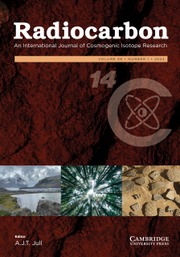Crossref Citations
This article has been cited by the following publications. This list is generated based on data provided by
Crossref.
Brown, T. A.
Farwell, G. W.
Grootes, P. M.
and
Schmidt, F. H.
1992.
Radiocarbon AMS Dating of Pollen Extracted from Peat Samples.
Radiocarbon,
Vol. 34,
Issue. 3,
p.
550.
Kneller, Margaret
and
Peteet, Dorothy
1993.
Late-Quaternary climate in the Ridge and Valley of Virginia, U.S.A.: Changes in vegetation and depositional environment.
Quaternary Science Reviews,
Vol. 12,
Issue. 8,
p.
613.
Peteet, D.M.
Daniels, R.A.
Heusser, L.E.
Vogel, J.S.
Southon, J.R.
and
Nelson, D.E.
1993.
Late-glacial pollen, macrofossils and fish remains in northeastern U.S.A. — The Younger Dryas oscillation.
Quaternary Science Reviews,
Vol. 12,
Issue. 8,
p.
597.
TÖRNQVIST, TORBJÖRN E.
and
DIJK, GEO J. VAN
1993.
Optimizing sampling strategy for radiocarbon dating of Holocene fluvial systems in a vertically aggrading setting.
Boreas,
Vol. 22,
Issue. 2,
p.
129.
Webb, Thompson
1993.
Constructing the past from late-Quaternary pollen data: Temporal resolution and a zoom lens space-time perspective.
Short Courses in Paleontology,
Vol. 6,
Issue. ,
p.
79.
Törnqvist, Torbjörn E.
and
Bierkens, Marc F. P.
1994.
How Smooth Should Curves Be for Calibrating Radiocarbon Ages?.
Radiocarbon,
Vol. 36,
Issue. 1,
p.
11.
Lower, J.J.
and
NASP Members
1995.
Palaeoclimate of the North Atlantic seaboards during the last glacial/interglacial transition.
Quaternary International,
Vol. 28,
Issue. ,
p.
51.
Eisner, Wendy R.
Törnqvist, Torbjörn E.
Koster, Eduard A.
Bennike, Ole
and
van Leeuwen, Jacqueline F.N.
1995.
Paleoecological Studies of a Holocene Lacustrine Record from the Kangerlussuaq (Søndre Strømfjord) Region of West Greenland.
Quaternary Research,
Vol. 43,
Issue. 1,
p.
55.
Walker, M.J.C.
1995.
Climatic changes in Europe during the last glacial/interglacial transition.
Quaternary International,
Vol. 28,
Issue. ,
p.
63.
Wohlfarth, Barbara
1996.
The chronology of the last termination: A review of radiocarbon-dated, high-resolution terrestrial stratigraphies.
Quaternary Science Reviews,
Vol. 15,
Issue. 4,
p.
267.
Kidder, Tristram R.
1996.
Perspectives on the geoarchaeology of the Lower Mississippi Valley.
Engineering Geology,
Vol. 45,
Issue. 1-4,
p.
305.
Lageras, Per
1996.
Farming and forest dynamics in an agriculturally marginal area of southern Sweden, 5000 BC to present: a palynological study of Lake Avegöl in the Småland Uplands.
The Holocene,
Vol. 6,
Issue. 3,
p.
301.
De Klerk, P.
Janssen, C. R.
Joosten, J. H. J.
and
Törnqvist, T. E.
1997.
Species composition of an alluvial hardwood forest in the Dutch fluvial area under natural conditions (2700 cal yearbp).
Acta Botanica Neerlandica,
Vol. 46,
Issue. 2,
p.
131.
CLAGUE, JOHN J.
MATHEWES, R. W.
GUILBAULT, J.‐P.
HUTCHINSON, I.
and
RICKETTS, B. D.
1997.
Pre‐Younger Dryas resurgence of the southwestern margin of the Cordilleran ice sheet, British Columbia, Canada.
Boreas,
Vol. 26,
Issue. 3,
p.
261.
Hoek, Wim Z.
1997.
Late-glacial and early Holocene climatic events and chronology of vegetation development in the Netherlands.
Vegetation History and Archaeobotany,
Vol. 6,
Issue. 4,
p.
197.
Björck, S.
Bennike, O.
Possnert, G.
Wohlfarth, B.
and
Digerfeldt, G.
1998.
A high-resolution14C dated sediment sequence from southwest Sweden: age comparisons between different components of the sediment.
Journal of Quaternary Science,
Vol. 13,
Issue. 1,
p.
85.
Törnqvist, Torbjörn E.
van Ree, Mark H.M.
van 't Veer, Ron
and
van Geel, Bas
1998.
Improving Methodology for High-Resolution Reconstruction of Sea-Level Rise and Neotectonics by Paleoecological Analysis and AMS 14C Dating of Basal Peats.
Quaternary Research,
Vol. 49,
Issue. 1,
p.
72.
Saarinen, Timo
1998.
High-resolution palaeosecular variation in northern Europe during the last 3200 years.
Physics of the Earth and Planetary Interiors,
Vol. 106,
Issue. 3-4,
p.
299.
Barnekow, Lena
Possnert, Göran
and
Sandgren, Per
1998.
AMS14C chronologies of Holocene lake sediments in the Abisko area, northern Sweden – a comparison between dated bulk sediment and macrofossil samples.
GFF,
Vol. 120,
Issue. 1,
p.
59.
Grigg, Laurie D.
and
Whitlock, Cathy
1998.
Late-Glacial Vegetation and Climate Change in Western Oregon.
Quaternary Research,
Vol. 49,
Issue. 3,
p.
287.

